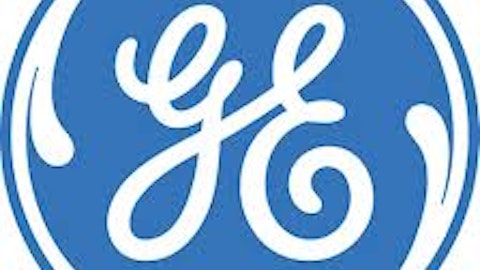General Electric Company (NYSE:GE) is one of America’s iconic companies and is a true conglomerate, producing everything from refrigerators to jet engines. GE is one of the biggest companies in the world and is a bellwether for corporate America.
While the past five years have seen a fair amount of turbulence for many of GE’s businesses, it appears that the company is back on solid footing. General Electric Company (NYSE:GE) shares have climbed more than 30% since the beginning of 2012, and the company has resumed increasing its dividend on a regular basis. Now that the dust has settled from the 2008 crash, does GE represent an attractive stock to buy?
Recent industry developments
General Electric Company (NYSE:GE) posted a 16% increase in first-quarter earnings per share year over year, despite ongoing weakness in Europe. On a segment-by-segment basis, it’s clear that some of GE’s business lines are performing better than others to start 2013.
Notably, GE’s flagship Industrials businesses, which range from jet engines to medical equipment, saw sales fall 6% in the first quarter. Shareholders should take note, since General Electric Company (NYSE:GE)’s Industrials operations accounted for 65% of total revenue in the first quarter.
Strength was seen in the company’s aviation and transportation segments, as well as from GE Capital, its financing arm. Another positive note was the company’s extensive backlog of orders in the first quarter. The backlog of industrial orders rose to $216 billion, representing the highest level in GE’s history.
While General Electric Company (NYSE:GE)’s extensive business has few true competitors, there are other stocks in the industrial space that warrant attention. United Technologies Corporation (NYSE:UTX) is a fellow industrial conglomerate whose businesses include Otis elevators and escalators; Pratt & Whitney aircraft engines; and Sikorsky military and commercial helicopters.
UTC’s net sales ticked up 3.4% in 2012 to $57.7 billion, while diluted earnings per share were essentially flat year over year. UTC has had some trouble digging itself out of the hole caused by the financial crisis. Sales are up only 14% since 2009, and the company’s debt to capital ratio increased by 15 percentage points last year as compared to 2011.
Competitor The Boeing Company (NYSE:BA) also has immense operations in aerospace and defense, and has the financial performance to back up its rallying share price. Boeing’s shares sit only a couple dollars away from its all-time high.
2012 was a banner year for The Boeing Company (NYSE:BA). The company booked a record $81.7 billion in revenue, representing a 19% increase year over year and earnings of $5.11 per share.
Boeing showed impressive resilience in its first-quarter earnings, reporting 18% growth in net income per share, despite the well-publicized issues surrounding the Dreamliner 787. The company is hardly expecting any negative effects from the issue at all. The Boeing Company (NYSE:BA) reiterated that it expects core earnings to reach $6.10 to $6.30 per share this year on revenue between $82 billion and $85 billion.



